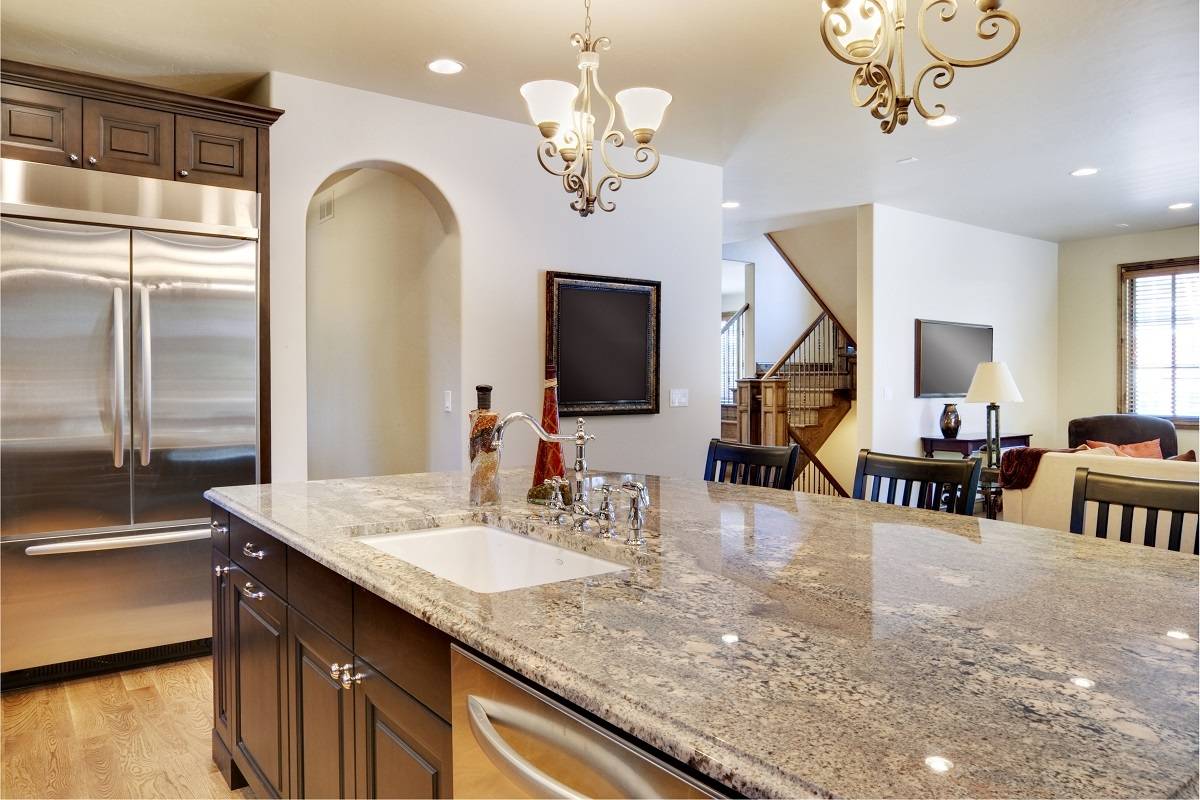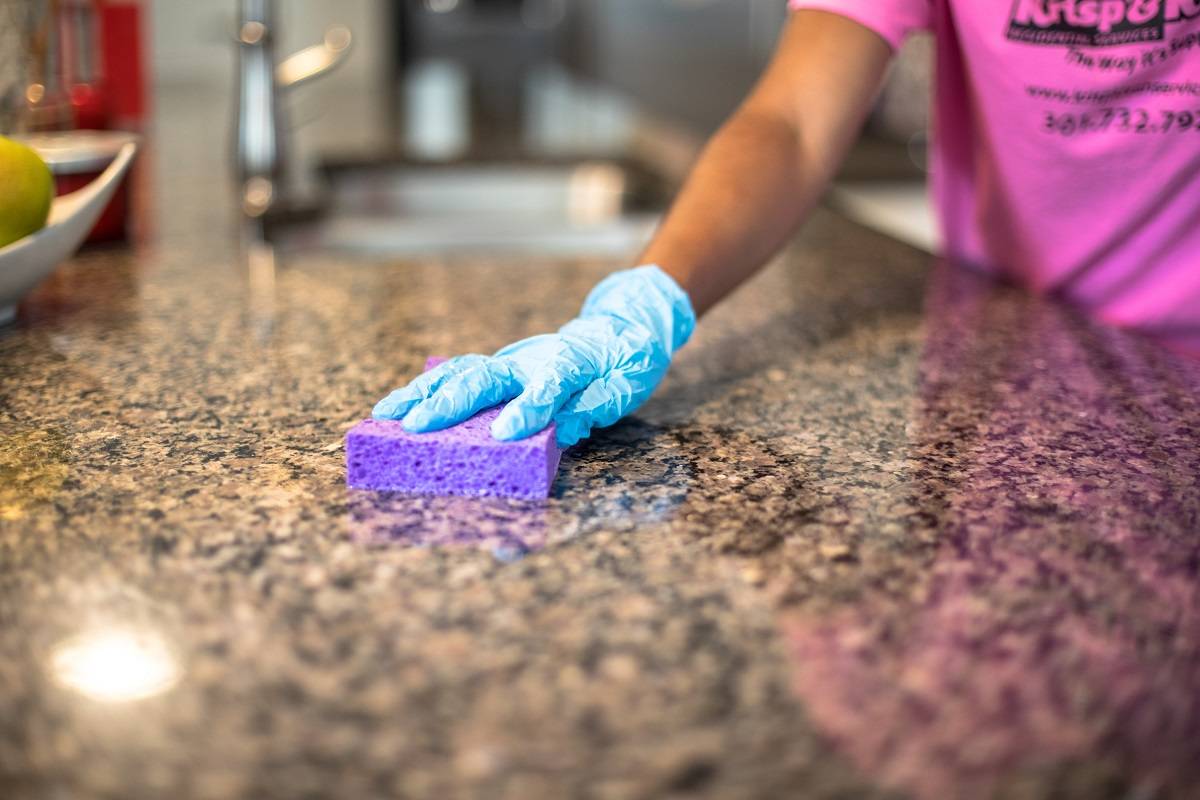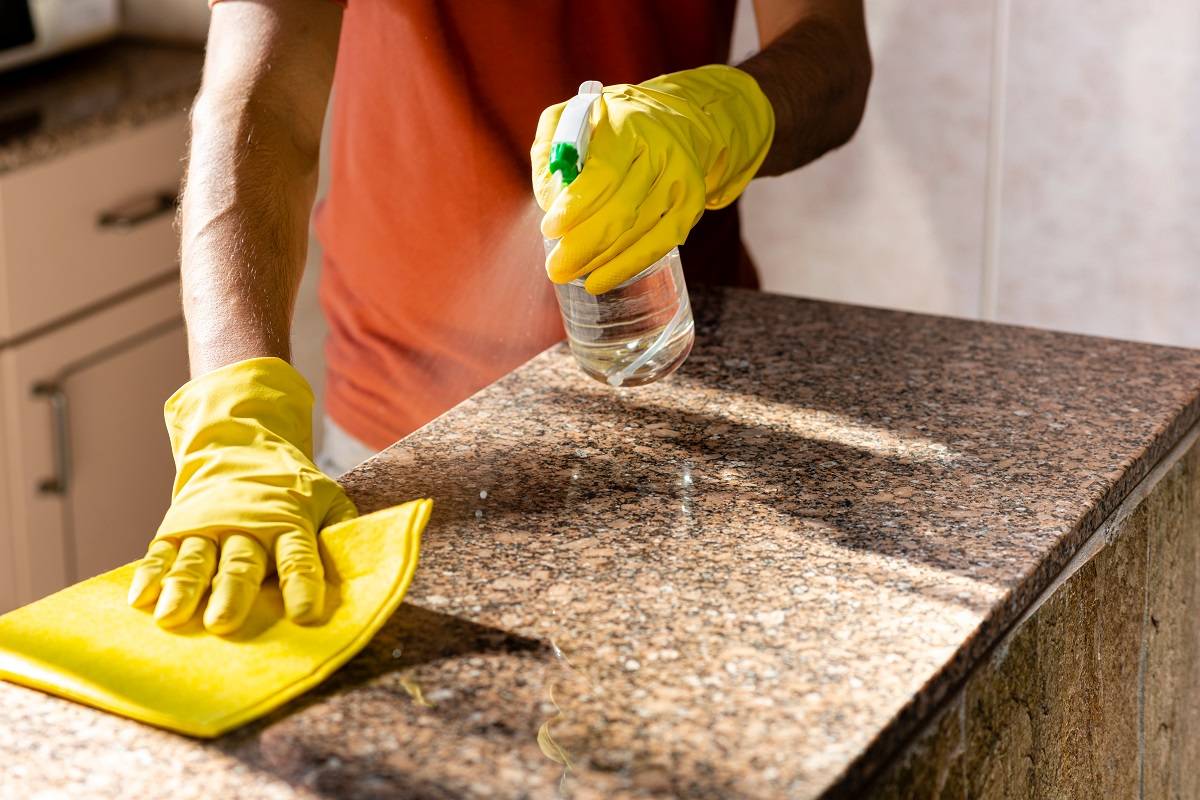How to Remove Stains from Your Granite Countertops
If your granite countertop is stained despite your best efforts to keep it spotless, rest assured that its beauty is not lost forever. Removing stains from granite is entirely possible with the right tools and tricks.
Granite is a naturally beautiful and durable stone that is used in kitchens and bathrooms throughout the world. Despite how eye-catching and seemingly durable granite is, it isn’t immune to stains or damage.
If your granite countertop is stained despite your best efforts to keep it spotless, rest assured that its beauty is not lost forever. Removing stains from granite is entirely possible with the right tools and tricks.
Is My Granite Countertop Stained or Etched?

Before you pull out your cleaning supplies and get to work removing your granite stain, you’ll first want to pinpoint if your countertops are stained or etched. The source of the stain will determine how you treat it, so it’s important to determine the underlying cause before treatment.
One common form of granite discoloration is a stain. When a stain occurs, the liquid is soaked into the granite’s pores, resulting in a color change. The culprit of stains is typically a spill or chemical exposure that has slowly caused damage over time.
However, removing a stain from granite is possible. As soon as the staining agent is removed, your granite countertops will look as good as new.
If your granite’s discoloration source is an etch, this requires a different cleaning approach altogether. When an etch occurs, it doesn’t result from excess material being absorbed into the granite. Rather, it results from a change in the material’s chemical composition. Store-bought stain removers or other DIY approaches likely won’t be successful in removing an etch, and you may end up causing more damage than it’s worth.
The cause of an etch is typically exposure to highly acidic or alkaline chemicals such as fruit juice, wine, coffee, or soda. We encourage you to seek the help of a professional if you believe you have an etch, as they will be able to pinpoint the cause of the stain.
Tools and Materials You Need to Remove Stains from Granite

Before you get started removing a stain from your granite countertops, be sure to collect the following materials to assist with the job:
- An absorbent base such as flour, sawdust, or paper towel
- A wicking chemical such as dish detergent for oil stains, hydrogen peroxide for food stains, or bleach for a biological stain
- Tape
- Baking soda
- Plastic wrap
- Olive oil
- Stir stick
- Plastic putty knife
Removing Stains on Granite: What Stain is It?

It’s important to identify what caused the stain to help you determine how you treat it. We’ve compiled some common causes of granite stains and how to remove them below.
1. Removing Oil Stains from Granite Countertops
Oils and fats are commonplace in many recipes, so if you spill, don’t panic. There’s a chance your sealed granite can ward off the oil from seeping into its pores. If not, pure acetone can remove it.
In order to prevent your oil-based stain from getting worse and causing your countertops to darken, be sure to use a dabbing motion instead of a swiping motion. To remove your oil stain from granite, take a small piece of paper towel and dip it in pure acetone. Gently blot the oil stain to remove it, and your countertops will look brand new again.
2. Removing Water Stains from Granite Countertops
Water stains on granite are also commonplace in the kitchen. To remove this type of stain, you’ll need to create a poultice, a solution easily made with household materials. Create a mixture with baking soda and 3 percent hydrogen peroxide. The consistency should be similar to a thick paste.
Apply this solution directly on top of the stain, covering it with plastic wrap that has small holes poked in it to allow air to escape. After 24 hours, remove the wrap and poultice with a damp cloth to avoid damage from the abrasive cloth. Your granite countertops should now be stain-free!
3. Removing Rust Stains from Granite Countertops

Rust stains are easier to identify as they typically have a colored copper appearance. However, they can be difficult to remove on your own. To remove rust stains on granite, first, try using 3 percent hydrogen peroxide onto the rust stain. Use a stone-safe cleaning pad or nylon brush to gently agitate the stain and let it sit for 24 hours.
Once 24 hours are up, rinse off the hydrogen peroxide with water to see if the stain was lifted. If not, it’s recommended to call a professional, as rust stains on granite can be difficult to get out without causing additional damage.
4. Removing Organic Stains from Granite Countertops
Organic stains refer to food or beverage stains such as tea, gravy, or mustard that have caused an unfortunate stain on your granite countertops. They typically are pink or brown in color and are simple to remove.
Use 30-40 percent by-volume concentration of hydrogen peroxide to lift this stain and wipe it clean with water.
5. Removing Ink & Paint Stains from Granite Countertops

Ink stains on granite countertops are a bit trickier to remove, but it can still be done. Be mindful that the color of your granite can help you determine which cleaning approach you take. Dark-colored granite countertops can be cleaned with acetone, while light-colored granite countertops can be cleaned with 20 percent hydrogen peroxide.
To avoid potential damage, take a small cotton swab and dip it into the correct liquid. Use a small amount directly on the stain, only targeting small sections at a time. You’ll want to wipe the excess material off between sections to prevent the cleaning agent from causing damage to the natural stone.
Repeat as necessary until the stain has been removed.
Paint requires a different cleaning method. In reality, it can be difficult to remove paint stains on your granite countertops on your own, so call a professional if this olive oil method doesn’t work.
Add a thin layer of olive oil to any paint stains and use a rag to wipe in a circular motion. You can also wrap a small putty knife with a washcloth or rag and lightly apply pressure to the paint stain’s edge. If these methods don’t work, you’ll want to lean on a professional to avoid any further damage.
What About Resilient Stains?
Some stains are easier to remove from your granite countertops than others. In some cases, the stain may have had too much time to soak into your granite. Sometimes, the source of the stain is difficult to remove on your own.
As we mentioned previously, a poultice granite solution can help remove tough stains. Simply create a mixture of an absorbent base with a wicking chemical depending on the type of stain present. The poultice should be applied directly on top of the stain in a ¼-inch or ½-inch layer, and it should be covered with plastic wrap and tape for 24 hours.
Once a day has passed, use a damp rag to wipe away any excess material, and repeat as necessary. You may find that more difficult stains take up to 5 rounds of poultice applications in order to be removed completely. The end result will be worth your time and effort!
Conclusion
We know it can be intimidating to remove granite stains on your own. After all, your granite countertops are likely a focal point in your home. Our team at Pro Stone Countertops pride ourselves on providing our customers with accurate and helpful information to empower them to take on these tasks alone. This ultimately helps save you a significant amount of time and money.
If you have additional questions about how to remove stains from your granite countertops, you can always reach out to our team. All of our work is completed in-house, and we have a combined 100 years of experience in the industry. We know what it takes to keep your countertops looking brand new, and we’re always happy to lend you a hand.
Contact us today if you need more information or if you would like to learn more about getting a custom quote for your project.

